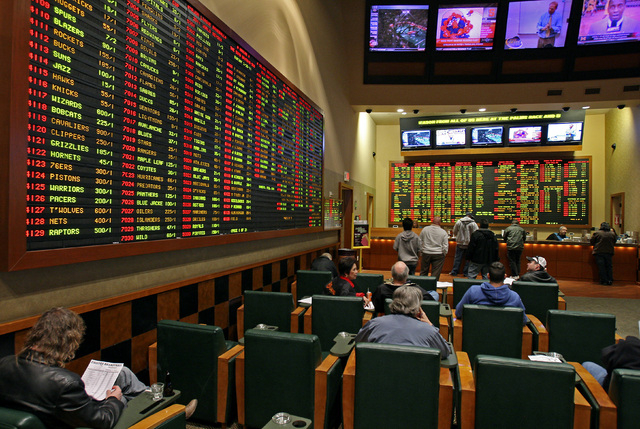Titus’ bill would repeal handle tax
CG Technology CEO Lee Amaitis wanted to know the whereabouts of about $9 million that Nevada sports book operators paid to the federal government last year through a tax on all sports wagers.
It seemed like a simple question.
Amaitis asked Rep Dina Titus, D-Nev., if she could find out.
The Internal Revenue Service took several months to answer the query posed by Titus’ legislative director, David Rosenbaum.
The question seemed to perplex the agency. The IRS couldn’t answer how the money was being used.
The congresswoman then devised her own response. She introduced a bill last month to repeal the tax.
“The IRS didn’t even know it existed,” Titus said. “The money just went into some black hole in the general fund.”
In the grand scheme of the federal government, we’re not talking about a lot of money.
Nevada sports book operators pay 0.0025 percent in a federal handle tax on every sports wager placed in the Silver State.
In 2013, based on the record $3.6 billion wagered on college and professional sports, the amount sent to the IRS was $9 million.
Amaitis said CG Technology, which operates race and sports books at eight Las Vegas hotel-casinos, paid about 25 percent of the state’s total handle tax burden.
“It’s not that I didn’t want to pay to the tax,” Amaitis said. “I just wanted to know where the money went.”
Titus, whose district includes the Strip, downtown Las Vegas and the Boulder strip, said keeping the money in-state makes the most sense.
“It can be reinvested into Nevada’s economy,” Titus said. “Gaming is our lifeblood, and this is a drop in the bucket to Washington.”
Amaitis is happy with Titus’ solution.
“Every state needs money,” Amaitis said. “This is peanuts to the feds.”
Nevada sports books have set record wagering handles annually since 2010. Analysts credit the development of mobile sports wagering and other means, such as sports wagering kiosks, with increasing the ways sports fans can place bets.
This year could be another record-setting year, and Amaitis said that would translate into more money leaving the state.
“We’re a donor state, not a recipient,” Amaitis said. “Why isn’t the money staying here? It’s a small amount of money for the federal government, but it’s not a small amount of money for our state.”
Nevada sports book operators pay a state gaming tax of up to 6.75 percent on revenue. In 2013, the bookmaking industry collected a calendar-year record $202.8 million in revenue.
Rosenbaum said the IRS at first was unsure how to answer questions about the handle tax.
Some of the initial information provided to the congresswoman’s office was inaccurate. Researchers discovered payments from Nevada sports books are lumped into a collection vehicle along with money paid by other states, including Indian gaming fees.
Rosenbaum said the tax was put in place to penalize illegal sports book operators.
The federal handle tax’s origin, however, is vague.
Amaitis said it was instituted before the 1992 passage of the Professional and Amateur Sports Protection Act, otherwise known as the Bradley Act, which defined the legal status of U.S. sports wagering. The activity is limited to Nevada, Delaware, Oregon and Montana.
Titus’ bill is only three paragraphs. It doesn’t seek to rewrite the entire U.S. tax code. But it would eliminate a sports betting tax.
The idea is to draw attention to the measure and possibly attach it to some type of federal tax reform legislation that could be enacted next year.
“We want to get people talking about it,” Titus said.
She might find support from Delaware, but the contribution to the handle tax from the state, which offers just football parlay card wagering, is pennies compared with Nevada’s.
Nevada, with its multimillion-dollar race and sports book facilities and an industry that accepts a vast spectrum of wagers on professional and college sports, is being singled out by the tax.
Like Titus, Amaitis believes the money should stay home.
“This seems like a penalty being paid by Nevada,” he said.
CG Technology would invest the handle tax money in its state operations, such as funding new advancements in mobile sports wagering and other products.
Amaitis also said he would be open to discussing Nevada implementing a handle tax on sports books wagers, as long as the federal tax was eliminated. That move would be up to the Legislature.
Titus’ bill achieved something no one anticipated: mutual agreement among the warring factions of Nevada’s sports wagering industry.
William Hill U.S. CEO Joe Asher said he supports Titus’ effort. Like rival CG Technology, Asher said William Hill would reinvest in Nevada, where it operates 74 sports books.
“Moving away from a federal handle tax is a good idea,” Asher said. “We like the Nevada model better.”
Amaitis said he has talked with other sports book operators about the handle tax, including casino companies that manage their own sports books. He said he first explored the issue several years ago.
Nevada Gaming Control Board Chairman A.G. Burnett said he didn’t have an opinion on Titus’ bill but said the agency would monitor its progress.
Amaitis doesn’t believe the federal government would miss the tax. After all, the IRS couldn’t even find the money when asked.
“We just believe the money should be coming back to the state in whatever form,” Amaitis said.
Howard Stutz’s Inside Gaming column appears Wednesdays and Sundays. He can be reached at hstutz@reviewjournal.com or 702-477-3871. Follow @howardstutz onm Twitter.

















